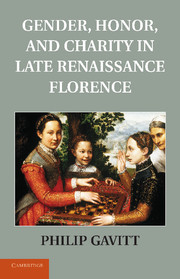Book contents
- Frontmatter
- Contents
- Acknowledgments
- Introduction
- 1 Charity, Discipline, and State-Building in Cinquecento Florence
- 2 Gender, Lineage Ideology, and the Development of A Status Culture
- 3 Law And the Majesty of Practice
- 4 Innocence and Danger: Pedagogy, Discipline, and the Culture of Masculinity
- 5 From Putte to Puttane: Female Foundlings and Charitable Institutions in Florence
- 6 Unruly Nuns: Clausura And Confinement
- Conclusion: The Honor of God, of the City, and of Their Own Houses
- Bibliography
- Index
- References
Conclusion: The Honor of God, of the City, and of Their Own Houses
Published online by Cambridge University Press: 07 September 2011
- Frontmatter
- Contents
- Acknowledgments
- Introduction
- 1 Charity, Discipline, and State-Building in Cinquecento Florence
- 2 Gender, Lineage Ideology, and the Development of A Status Culture
- 3 Law And the Majesty of Practice
- 4 Innocence and Danger: Pedagogy, Discipline, and the Culture of Masculinity
- 5 From Putte to Puttane: Female Foundlings and Charitable Institutions in Florence
- 6 Unruly Nuns: Clausura And Confinement
- Conclusion: The Honor of God, of the City, and of Their Own Houses
- Bibliography
- Index
- References
Summary
The self-conscious appropriation of the humanist educational program during the sixteenth century in the service of fashioning an aristocratic ruling class was absolutely crucial to the recasting of educational discipline, and therefore to the fortunes of both men and women. What Manzoni described in the story of the nun of Monza, even if it exaggerated the coercive nature of the nun of Monza's monachation, certainly was historically accurate in its ascription of the count's motive: the preservation of the family's current standard of living. Yet it would still limit the scope of our inquiry to confine the discussion to class formation, because class formation was fundamentally about state formation. It is no accident that sixteenth-century treatises on the family so frequently are titled Institutiones. Humanist training, even – indeed especially – when it ended up in the hands of Jesuits, was directed toward political leadership. Thus, what from an economic point of view was an aristocratic response to the pressures of dowry inflation and the increasing urgency to put a lock on the safety of the family patrimony became an issue tied to charity and to social discipline. Just as the preservation of aristocratic status was tied to preservation of land and inheritance, so did humanist education and formation for leadership emphasize the importance of accentuating differences in hierarchy and status. The very process that Ginzburg describes in The Cheese and the Worms or that Bakhtin describes in his famous work on Rabelais bears out the notion that in the late Middle Ages, popular and learned culture could coexist more or less peacefully, but by the late sixteenth century, aristocratic self-definition and public order merged to require the moderation of popular culture, the regulation of carnival, and ultimately the conscious degradation and scorn of popular culture by mainstream culture. Discipline, in short, was the bond that connected noble status to a concern for public order and the need to confine and rationalize.
- Type
- Chapter
- Information
- Gender, Honor, and Charity in Late Renaissance Florence , pp. 228 - 244Publisher: Cambridge University PressPrint publication year: 2011



